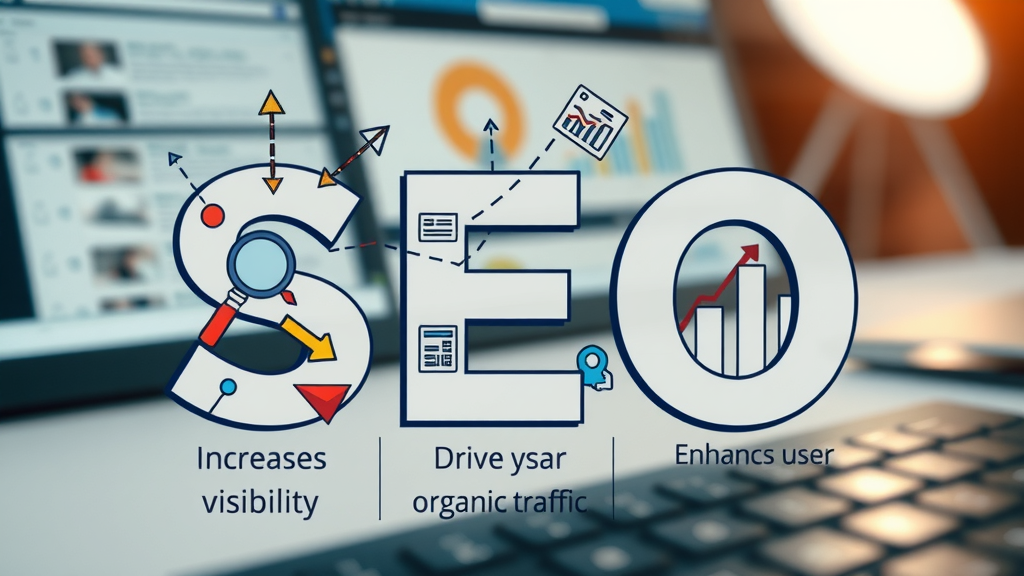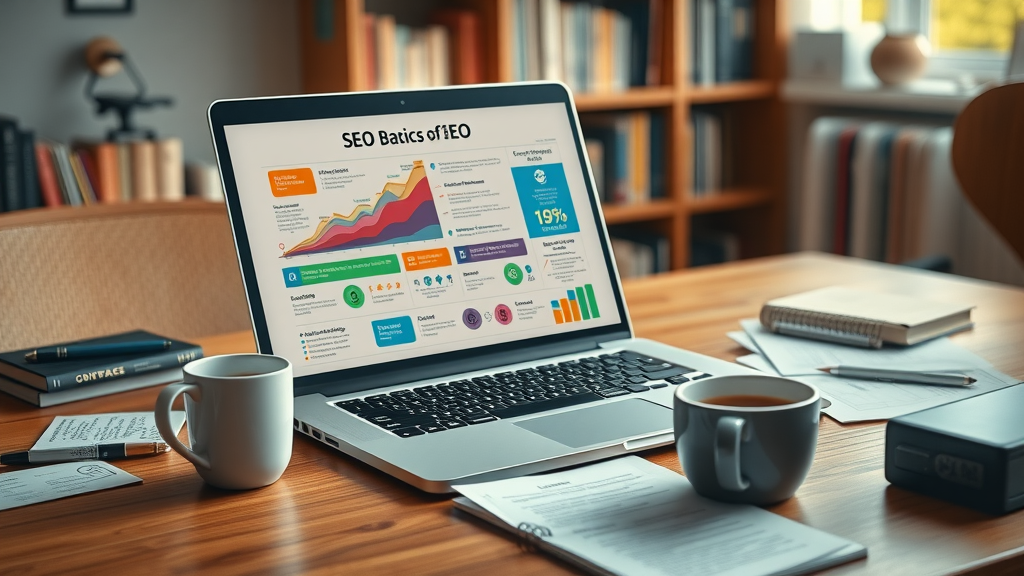In a bustling marketplace like Orlando, mastering local SEO ROI isn’t just a luxury—it’s a necessity for thriving businesses. As consumers increasingly turn to online searches to find local services, your visibility can make or break your success. This article, “Maximizing ROI with Local SEO: The Orlando Advantage,” dives deep into how harnessing local SEO strategies can yield remarkable returns on your investment. Ready to transform your online presence? Let’s explore how understanding the nuances of local SEO can propel your business to new heights!
What is Local SEO and Its Importance in ROI
Local SEO, or local search engine optimization, focuses on optimizing a business’s online presence to attract more customers from relevant local searches. This involves various strategies, including optimizing Google Business Profiles, local keywords, and online reviews. The local SEO ROI refers to the return on investment that businesses can achieve through these efforts.
Importance of Local SEO for ROI
- Increased Visibility: Effective local SEO ensures that your business appears in the local search results and Google Map Pack, leading to higher visibility among potential customers.
- Targeted Traffic: By focusing on local keywords, businesses can attract more qualified leads who are actively searching for products or services in their area.
- Enhanced Trust: A well-optimized online presence builds trust among consumers, leading to increased conversion rates and customer loyalty.
- Cost-Effective Marketing: Compared to traditional advertising methods, local SEO is often more cost-effective, providing higher returns for smaller investments.
Table: Benefits of Local SEO on ROI
| Benefit | Description |
|---|---|
| Increased Visibility | Higher presence in search results and Google Map Pack |
| Targeted Traffic | More qualified leads from local searches |
| Enhanced Trust | Builds credibility and customer loyalty |
| Cost-Effective Marketing | Lower marketing costs with better returns |

Calculating Local SEO ROI
Understanding how to calculate local SEO ROI involves analyzing the costs associated with your local SEO efforts and the returns generated from these strategies.
Key Metrics to Measure Local SEO ROI
- Traffic Volume: Analyze the number of visitors your website receives from local searches.
- Conversion Rates: Measure how many of those visitors convert into customers.
- Revenue Growth: Evaluate the increase in sales directly attributed to local SEO efforts.
- Customer Acquisition Cost (CAC): Determine the cost of acquiring a new customer through local SEO.
ROI Calculation Formula
To calculate the ROI of your local SEO efforts, use the following formula:
[ \text{ROI} = \frac{\text{Net Profit}}{\text{Cost of Investment}} \times 100 ]
Where:
- Net Profit = Revenue generated from local SEO - Costs associated with local SEO.
Block Quote
“Understanding how to calculate the return on investment in local SEO can help business owners make informed marketing decisions and optimize their budgets effectively.”

Local SEO Strategies to Drive ROI
Implementing effective local SEO strategies can significantly enhance your ROI. Here are some key tactics.
Leveraging Google Business Profile for Better Visibility
A well-optimized Google Business Profile is crucial for local SEO success. Ensure that your profile includes:
- Accurate business name, address, and phone number (NAP).
- Engaging images and videos showcasing your products or services.
- Regular updates and posts to keep your audience informed.
Importance of Local Keywords in Driving Traffic
Using local keywords in your content helps improve your visibility in search results. Consider the following strategies:
- Research and integrate relevant local keywords throughout your website.
- Use keywords in your Google Business Profile descriptions.
- Create content that answers common local queries.
Bullet Point List of Local SEO Strategies
- Optimize your Google Business Profile.
- Use local keywords in blogs and website content.
- Encourage customer reviews and manage online feedback.
- Engage with the local community through social media.

The Cost of Local SEO and Its Impact on ROI
Understanding the costs associated with local SEO is essential for calculating ROI effectively.
Monthly SEO Costs and Budgeting Strategies
Local SEO costs can vary based on the services you choose. Here’s a breakdown:
| Service | Average Monthly Cost |
|---|---|
| Google Business Optimization | $150 - $300 |
| Keyword Research & Content Creation | $200 - $500 |
| Local Link Building | $300 - $600 |
| Review Management | $100 - $300 |
Block Quote
“Investing in local SEO is a long-term strategy that can yield exponential returns, especially when compared to one-time paid advertising.”

Comparative Analysis: Local SEO vs. Paid Ads
When deciding between local SEO and paid ads, it’s essential to understand their respective benefits.
Understanding the Long-Term Benefits of Local SEO
- Sustainable Growth: Local SEO provides long-term visibility without ongoing costs, while paid ads require continuous investment.
- Higher Credibility: Consumers often trust organic search results more than paid ads, leading to higher conversion rates.
Case Studies: Successful Local SEO Implementations
Businesses that have effectively implemented local SEO strategies often see significant improvements in their ROI. For example:
- A local coffee shop increased foot traffic by 50% after optimizing their Google Business Profile.
- A service-based business saw a 30% increase in leads after targeting local keywords in their content.

Tools and Resources for Measuring Local SEO ROI
Utilizing the right tools can help businesses track their local SEO performance effectively.
Essential SEO Tools to Track Performance
- Google Analytics: Monitor website traffic, conversion rates, and user behavior.
- Moz Pro: Analyze keyword rankings and visibility.
- SEMrush: Track competitors and discover new local keywords.
Using Google Analytics for Local SEO
To effectively use Google Analytics for local SEO, focus on:
- Setting up goals to measure conversions.
- Tracking user behavior to optimize the customer journey.
- Analyzing traffic sources to understand where your visitors are coming from.

Building Trust and Engagement Through Local SEO
Building trust is crucial for converting leads into customers. Here’s how local SEO helps:
Managing Online Reviews for Enhanced Local SEO
Positive reviews can significantly impact your local SEO efforts. Here are tips for managing reviews:
- Respond promptly to both positive and negative reviews.
- Encourage satisfied customers to leave reviews.
- Use feedback to improve your services.
Creating Consistent and Relevant Content
Producing high-quality, localized content can attract and retain customers. Consider the following:
- Regularly update your blog with local events, news, and tips.
- Use local search terms to increase relevance and visibility.

Final Thoughts on Local SEO ROI
In conclusion, investing in local SEO can significantly enhance your ROI. By optimizing your online presence, leveraging local keywords, and managing customer feedback, you can build trust and drive traffic effectively.
Key Takeaways for Business Owners
- Measure Your ROI: Regularly calculate your local SEO ROI to ensure your strategies are effective.
- Invest Wisely: Understand the costs involved and target your budget accordingly.
- Stay Updated: Keep your Google Business Profile and website content fresh and relevant to maintain high rankings.
Action Items to Improve Local SEO Strategy
- Optimize your Google Business Profile today.
- Conduct keyword research to identify local search terms.
- Engage with customers through social media and encourage reviews.

FAQs
Q: How long does it take to see results from local SEO?
A: Typically, businesses can expect to see results from local SEO efforts within 3 to 6 months, depending on competition and the effectiveness of the strategies implemented.
Q: Can I manage local SEO myself?
A: Yes, many small businesses manage local SEO independently by utilizing tools like Google My Business, Google Analytics, and SEO plugins for website management.
Conclusion
Investing in local SEO is crucial for businesses aiming to improve their visibility and ROI. By focusing on local keywords, optimizing your Google Business Profile, and managing online reviews, you can create a powerful local presence that drives traffic and revenue.
Key Takeaways
- Local SEO significantly impacts your business’s visibility and ROI.
- Calculating your local SEO ROI is essential for informed marketing decisions.
- Consistent engagement and quality content are vital for maintaining local search rankings.
With these strategies in place, you can navigate the competitive landscape of local search and maximize your ROI effectively!
 Add Row
Add Row  Add
Add 



Write A Comment